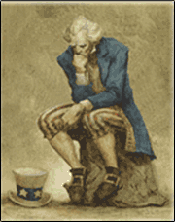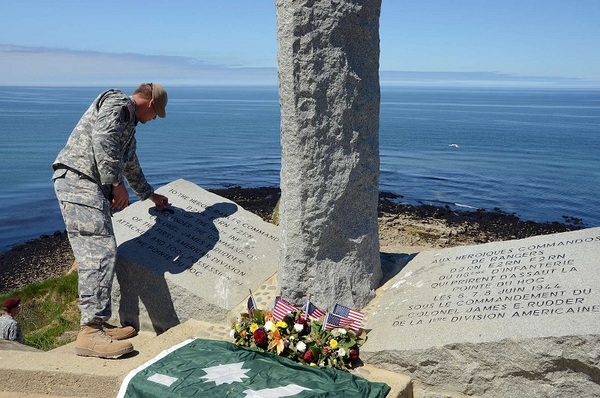
–>
June 6, 2022
“Soldiers, Sailors, and Airmen of the Allied Expeditionary Force: You are about to embark upon the Great Crusade, toward which we have striven these many months. The eyes of the world are upon you. The hopes and prayers of liberty-loving people everywhere march with you.”
‘); googletag.cmd.push(function () { googletag.display(‘div-gpt-ad-1609268089992-0’); }); }
Eisenhower’s speech, on the eve of the greatest military campaign for freedom in human history, was matched only by the speech of President Ronald Reagan in 1984 on the fortieth anniversary of that event. “The men of Normandy had faith that what they were doing was right, faith that they fought for all humanity, faith that a just God would grant them mercy on this beachhead or on the next.” D-Day remains one of the greatest manifestations of the American, and human, spirit of liberty and courage ever known.
We are told that America stands at a crossroad. America has always been standing at crossroads. And time and again America has weathered the storm and come back stronger and freer than before. While it is easy to despair, we must remember what propelled the spirit of freedom and progress — true freedom and progress — into the new dawn despite the surrounding darkness.
What Eisenhower and Reagan’s speeches have in common is a thread going back to our Founding Fathers and the very spirit that birthed America.
‘); googletag.cmd.push(function () { googletag.display(‘div-gpt-ad-1609270365559-0’); }); }
In his inaugural address, George Washington said, “I dwell on this prospect with every satisfaction which an ardent love for my Country can inspire: since there is no truth more thoroughly established, than that there exists in the economy and course of nature, an indissoluble union between virtue and happiness, between duty and advantage.”
Thomas Jefferson, sometimes cast as the scourge of the majority of the Founding Fathers for his acute and heightened radicalism, nevertheless fell in the same camp when it came to liberty and virtue. In his Notes on the State of Virginia, Jefferson remarked:
“With the morals of the people, their industry also is destroyed. For in a warm climate, no man will labour for himself who can make another labour for him. This is so true, that of the proprietors of slaves a very small proportion indeed are ever seen to labour. And can the liberties of a nation be thought secure when we have removed their only firm basis, a conviction in the minds of the people that these liberties are of the gift of God? That they are not to be violated but with his wrath? Indeed I tremble for my country when I reflect that God is just: that his justice cannot sleep for ever.”
What Washington and Jefferson both reveal is that liberty and happiness are tied to virtue and God. Without virtue and God, the liberty and happiness we enjoy and seek sinks into despotism and alienation, frustration and darkness.
 Move forward to 1944 and 1984, over 150 and nearly 200 years removed from the words of Washington and Jefferson, both Eisenhower and Reagan appeal not to something new, but to something deeply rooted in American history and consciousness: liberty and duty, freedom and virtue, made possible under God.
Move forward to 1944 and 1984, over 150 and nearly 200 years removed from the words of Washington and Jefferson, both Eisenhower and Reagan appeal not to something new, but to something deeply rooted in American history and consciousness: liberty and duty, freedom and virtue, made possible under God.
What moved the brave men who stormed the beaches of Normandy and scaled the cliffs of Pointe du Hoc was the firm resolve and spirit that liberty and virtue, freedom and duty, God and justice, were bound together and it is only in this unity that true freedom and progress be enjoyed. The relativism preached today is contrary the American Founding and the American resolve and spirit that confronted the great darkness of Nazism and totalitarian ideologies in the twentieth century.
‘); googletag.cmd.push(function () { googletag.display(‘div-gpt-ad-1609268078422-0’); }); } if (publir_show_ads) { document.write(“
Looking back at the great American tradition of freedom, we find the necessity of virtue and belief in the justice of God as the common pillars upon which freedom stands. Today’s license of choice exiles virtue and God from freedom. This is intentional. The enemies of freedom and progress who seek to enact centralizing decrees over all need the elimination of virtue and God from the hearts of the people in order for their totalitarian impulses to be realized.
There is no virtue in burning buildings, defacing homes, chanting slogans, and yelling bullhorn rants at people whom you disagree or despise. These are not the new Americans for freedom but the brainwashed brownshirts of a new fascism and Bolshevism descending over our country. To hide this reality, they appropriate the language of freedom and democracy but intend slavery and despotism.
The young men filled with courage who embarked on that “Great Crusade” were the individuals filled with real virtue and a spirit of sacrifice under the belief of a just God. They were the men who gave all for humanity. They were the men who brought light into the darkness. They were the men who knew that freedom and virtue were an “indissoluble union” and that the new birth of freedom that victory in World War II offered would only be possible through a sustained courage, virtue, and spirit of sacrifice under the auspicious of God.
D-Day reached into the spiritual and historical power of America and the broader Western World that was engaged in this monumental and heroic fight against darkness and tyranny. In this struggle our heroes embraced the best of who they were and what their traditions had to offer in strengthening their resolve and comforting their fears. As Reagan said, “Something else helped the men of D-Day: their rock-hard belief that Providence would have a great hand in the events that would unfold here; that God was an ally in this great cause.” Pray we never forget the real spirit of the greatest generation as well as the source of strength and renewal for the preservation of liberty available to every generation so long as we have the courage to reach for it ourselves.
Paul Krause is the editor of VoegelinView. He is the author of The Odyssey of Love: A Christian Guide to the Great Books, The Politics of Plato, and contributed to The College Lecture Today and Making Sense of Diseases and Disasters.
Image: National Archives
<!– if(page_width_onload <= 479) { document.write("
“); googletag.cmd.push(function() { googletag.display(‘div-gpt-ad-1345489840937-4’); }); } –> If you experience technical problems, please write to [email protected]
FOLLOW US ON
<!–
–>
<!– _qoptions={ qacct:”p-9bKF-NgTuSFM6″ }; ![]() –> <!—-> <!– var addthis_share = { email_template: “new_template” } –>
–> <!—-> <!– var addthis_share = { email_template: “new_template” } –>






